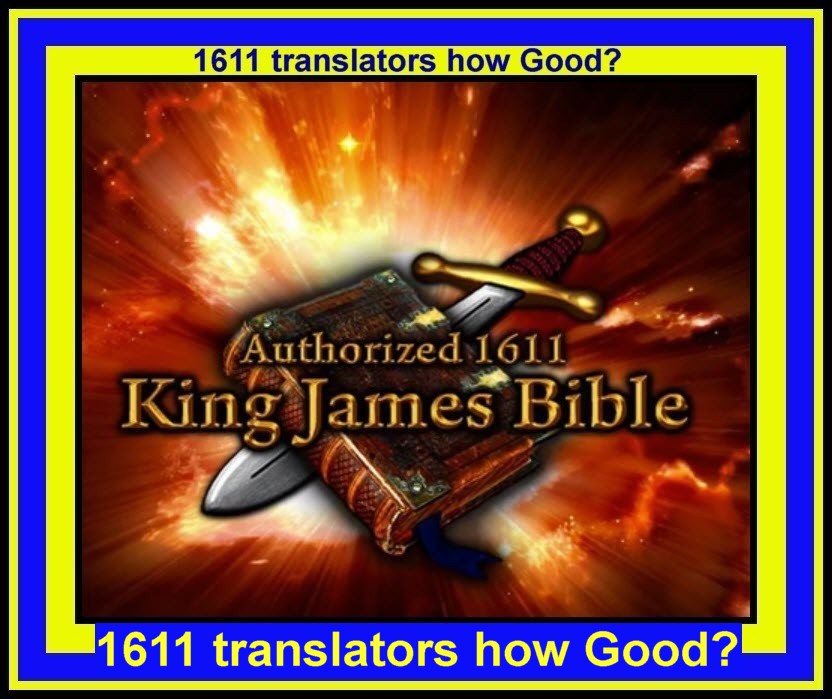 “HOW GOOD WERE THOSE 1611 TRANSLATORS?”
“HOW GOOD WERE THOSE 1611 TRANSLATORS?” “HOW GOOD WERE THOSE 1611 TRANSLATORS?”
“HOW GOOD WERE THOSE 1611 TRANSLATORS?”
The Peanut Gallery thinks that in 1611, King James
of England suddenly, and impulsively, had a spur-of-the- moment light bulb
experience and announced “We’re going to write a new Bible!”
Dear Reader, as a foundation, check all the other
teachings we have on this …
“Where was the Bible before 1611?” and
“The Qualifications of the 1611 Translators” and
“The 1611 Translators Dedicatory” plus all the other teachings under
“Which Bible” and more.
This teaching article looks at the various steps
involving the 54 translators, in six groups … two at Oxford, two
at Westminster, two at Cambridge.
To start with, let’s remind ourselves how exceptionally
brilliant these 1611 Translators were:
1. They were not bragging … but simply telling the truth … when they
stated they came “learned … not to learn.”
2. They came “… to make a good Bible better …”
3. They came “ … to polish up the gemstone more
brightly …”
4. And this Dear Reader …
“We weary the unlearned, who need not know so much,
and TROUBLE THE LEARNED, who know it already”
In common parlance … “Put down your ‘paddle-pop’
stick money kiddies, we have the authentic cash!”
5. Furthermore they stated “The
Greek being not altogether clear, and with the Latin being derived from it, it
must needs be muddy.”
6. In addition, they state “We never thought
from the beginning, we should need to make a new translation … but to make a
good one better … out of many good ones, one principal good one … NOT JUSTLY TO
BE EXCEPTED AGAINST …”
In common parlance … “No-one will have any JUST reason to argue against our
translation!”
In the lingua franca “They were the complete
package! … they had the goods! … they knew it all! … no-one could
stump them! … no error could be found!”
As Richard Kilbye, a 1611 translator said “A critic
gave me three reasons why that word should have been such and such, and
I gave him thirteen reasons why we chose it!”
Anyhow, let’s get on …
these were THEIR BASIC
RULES … summarised for reader ease …
1. The Bishop’s Bible to be basically followed.
2. The names of prophets etc in the text to be kept
as they were vulgarly used.
3. The old ecclesiastical words to be kept eg
“church” instead of “congregation”.
4. A word with divers significance to be kept as
most commonly used by ancient fathers.
5. Chapter division to be kept as close as
possible.
6. No marginal notes to be fixed except for the
explanation of some Hebrew or Greek words
7. Quotes of places to be marginal for the fit
reference of one scripture to another.
8. Every man in every company, take the same
chapter’s, having translated and amended by himself, to meet together to
confer, and agree for their parts to stand.
9. One company having completed any book, shall
send it to the other two companies.
10. Should any one company differ from another,
should send their reasons, and to be compounded at a general meeting, such that
all should agree.
11. Any man, indeed bishop in the kingdom, having
skill in the various tongues (Greek, Hebrew etc) send his observations to the
any of the companies at Westminster, Oxford or Cambridge universities.
12. Any skilful learned man in the kingdom to be
contacted for his judgment on special obscurities.
13. The Deans of Westminster and Chester, and the
King’s professors in the Hebrew or Greek to be present at these universities.
14. The translations of the 1611 Translators to be
used when they agree better than the texts of the Bishop’s Bible, Tyndale’s,
Matthew’s, Coverdale’s, Whitchurch’s Great Bible and the Geneva.
15. Three or four of the ancient and grave divines of
the universities, not employed in translation, to be overseers of the
translation, as well as the Greek and the Hebrew, when a word had divers
significations.
In essence:
1. Each scholar made his own translation
2. Passed it on to be reviewed by each other member
of his company
3. When each section had completed a book of the
Bible, it was sent to the other five groups for independent critique.
4. In this way, each book went through the hands
and minds of the entire body of translators.
5. To guard against further errors, another
committee was formed by selecting two out of the each of the three companies.
6. Thus the entire translation came before this
select group where any differences of opinion were ironed out.
The English
Bible had been around for centuries … you know … Wyclif, Tyndale, Coverdale,
Matthew, Great, Geneva and Bishop … as the translators said “…
we have
simply purified it! ”
“How good? HOW
GOOD!!”
Harley
Hitchcock
September
2024
This
website’s front page is:
www.